Blog

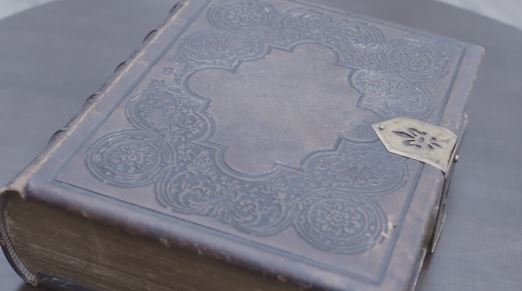
How Facebook Users Reunited a Bible with its Family: Facebook for Family History
 These genealogy sleuths used Facebook for family history when they responded to a plea to help return a family Bible to its family.
These genealogy sleuths used Facebook for family history when they responded to a plea to help return a family Bible to its family.
Back on March 21, Donna Whitten posted a video on her church Facebook page. Her post says, “How far would you go to get back something you’ve lost?”
She was talking about a 150 year-old family Bible she’d come across while antiquing one day in Chattanooga, Tennessee. Her post says, “We want to find this family and return it to them! Can you help?” (Click here to see that post and video.)
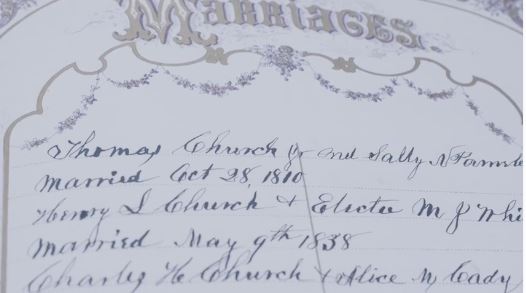 That video post got 34,000 views, thanks in part to more than 600 people who shared it! Family history fans immediately stepped up to the challenge. They looked for names on Ancestry.com and reached out to tree owners. Within two days, several descendants were aware of the Bible and asking for copies. The bible eventually went to a woman in California named Carrie Robinson, who has been researching her tree for several years. It contained obituaries clipped from newspapers and handwritten vital family events. (Wouldn’t you love to receive that kind of family treasure?) Click here to watch the follow-up video about when Donna took the bible to the new owner.
That video post got 34,000 views, thanks in part to more than 600 people who shared it! Family history fans immediately stepped up to the challenge. They looked for names on Ancestry.com and reached out to tree owners. Within two days, several descendants were aware of the Bible and asking for copies. The bible eventually went to a woman in California named Carrie Robinson, who has been researching her tree for several years. It contained obituaries clipped from newspapers and handwritten vital family events. (Wouldn’t you love to receive that kind of family treasure?) Click here to watch the follow-up video about when Donna took the bible to the new owner.
Hats off to Donna and her team of sleuths who took the time to find Carrie’s family and return their past to them! I find a few take-home messages in this story:
- Social media is a great way to cast your net wide, not just when you’re sharing family history, but when you’re looking for information. Click here to read more about gathering memories through Facebook.
- You can watch for orphaned heirlooms in your path and return them to descendants. Click here to read tips on how to do that.
- The video Donna created got attention on Facebook! Video is powerful. Use it to share your family history. (Full disclosure: This post contains affiliate links and I will be compensated if you make a purchase after clicking on my links. I appreciate you using these links because that compensation helps make the Genealogy Gems blog possible. Thank you!) Click here to read about Animoto, a DIY-video making service I love that lets you produce your own professional-quality videos. Below is one quick video I created. Can you say shareable?!

The History of Genealogy Gems and of Christmas Seals

Dear Beloved Listeners, Readers, and Viewers,
I’m writing to you today to tell you how much you mean to me. You’re the reason why I can’t wait to grab my phone before I get out of bed, just to see what you’ve had to say. Your emails of shared success stories, challenges, questions, and feedback are each carefully read. Genealogy Gems is after all, created for you.
I so clearly remember the moment back in 2007 when it hit me how creating a podcast would provide me with a way to share what I had learned about researching family history. It would be a way to connect with all of you out there who are in pursuit of the same passion. Now, over 2 million downloads later, we have shared a lot and it’s been glorious.
 Our 10th anniversary together isn’t quite here yet (February 2017), but I do want to dip back into 2007 and share with you one of the first videos I created for you. It was a Christmas story about the origins of Christmas seals, and my own personal story about when I first fell in love with them. I know, the images in the first part of the video are a bit grainy. Online video production was in its infancy way back then in 2007. But, it’s a lovely story just the same, and the Christmas wishes I sent then are still as strong today.
Our 10th anniversary together isn’t quite here yet (February 2017), but I do want to dip back into 2007 and share with you one of the first videos I created for you. It was a Christmas story about the origins of Christmas seals, and my own personal story about when I first fell in love with them. I know, the images in the first part of the video are a bit grainy. Online video production was in its infancy way back then in 2007. But, it’s a lovely story just the same, and the Christmas wishes I sent then are still as strong today.
Have a very Merry Christmas!
Your friend,
Lisa
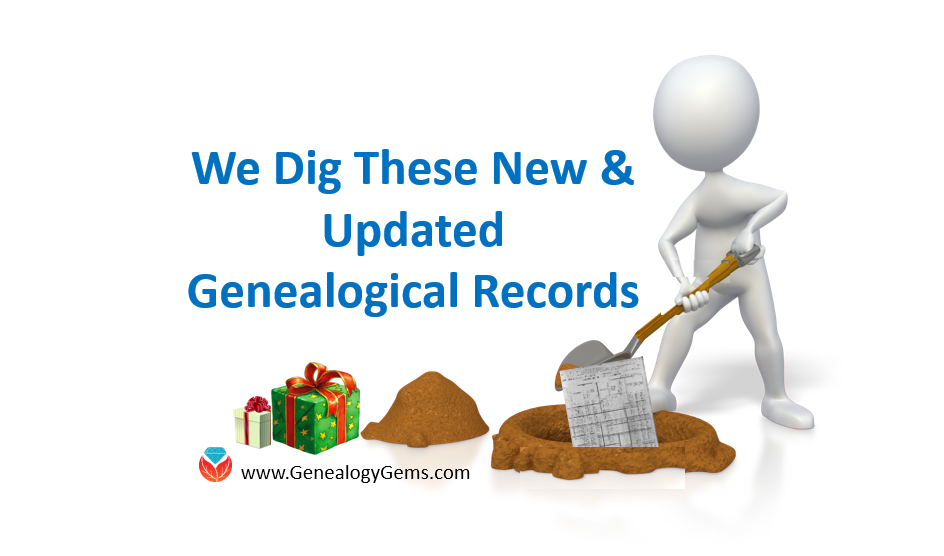
Open the Gift of New and Updated Genealogical Collections From Around the World
Happiest of holiday greetings to you! Celebrate with us as we share the gift of new and updated genealogical collections like censuses, histories, and school records from all around the world. This week: the United Kingdom, Australia, France, Peru, Ecuador, and the U.S.

United Kingdom – Military
New records at Findmypast this week include the British Army discharges, 60th Foot 1854-1880. These British Army discharges will allow you to find your ancestor who served in the King’s Royal Rifle Corps. The records will contain service numbers, ranks, and the reason for discharge.
The 60th Regiment of Foot saw action in the Seven Years War, Napoleonic Wars, and Peninsular War. They have served in India, Burma, Afghanistan, China, and South Africa. The men found in these records most likely fought in The Indian Mutiny (1857-1859), in Canada during the Fenian raids (1866-1867), and The Zulu War (1879).
United Kingdom – Histories
Over 13,000 records have been added to Findmypast’s collection titled Britain, Histories & Reference Guides. The collection consists of 65 volumes on genealogy, heraldry, palaeography, geography, and more. The information found in these records may provide you with more insight into the lives of your ancestors and an better understanding of British life. For a more detailed description of the history publications and what each may offer, see the list at the bottom of the collection page.
England – Middlesex – Military
The Middlesex War Memorials at Findmypast contain over 21,000 transcripts of memorials from over 40 parishes across the English county of Middlesex. The new additions to this collection list the names of soldiers who died while on active service between 1845 and 1998.
Each record will include a transcript of the individual entry from the war memorial and a full transcript of all the names that appeared alongside your ancestor. Other information found on the records may include the conflict they served in, where and when they were killed, a brief description, and additional notes. Transcripts also include links from the West Middlesex Family History Society providing greater detail about the memorial such as the memorial’s location and explanations of abbreviations.
Australia – Queensland – Passports
Also at Findmypast this week, the Queensland Passports Index 1915-1925 of over 13,000 names is a helpful collection for those searching traveling ancestors! This collection is an index. The original registers were compiled by the Collector of Customs, Brisbane, and are currently held by the National Archives of Australia. Each record includes a transcript and may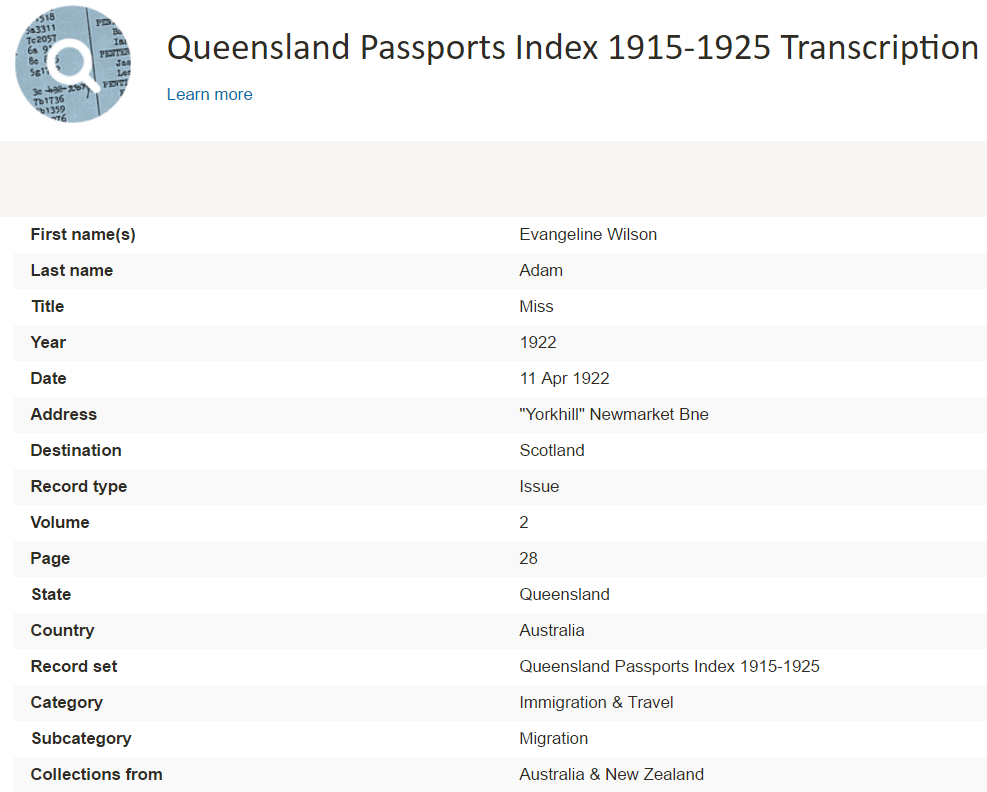 contain the following information:
contain the following information:
- Name
- Year the record was taken
- Address or residence
- Date they applied for or renewed a passport
- Their intended destination
Depending on the period covered, the registers themselves may include additional information such as passport numbers, warrant numbers, and remarks. Remarks may include details about soldiers returning home from the Great War.
Australia – New South Wales – Census
Explore the only surviving records from the New South Wales 1841 Census at Findmypast. Containing almost 11,000 names, this collection includes both fully searchable transcripts and scanned images of the original household returns, affidavit forms, and abstracts of returns.
Censuses like these often help piece together the family unit. Names, sex, ages, and birth places are common finds in this record set. Images of the original forms may also occasionally provide you with additional information such as:
- Religion
- Occupation
- Civil condition
The amount of information included will vary depending on the type of document.
France – Dordogne – Census
New and updated genealogical collections at FamilySearch this week include the France, Dordogne, Censuses, 1856 and 1876. These censuses may contain the following information:
- Surname
- Given name
- Age
- Occupation
- Nationality
- Position in the household
Each record contains a transcription and digital image. These census records are in French.
Peru – Civil Registration
Civil registration records are particularly helpful when church records are unavailable. FamilySearch has added new records to their collection titled Peru, La Libertad, Civil Registration, 1903-1998. Births, marriages, deaths, and other records are contained in this collection set. Some of these records have been indexed and are searchable. Additional images and indexed records will be published as they become available. These records are written in Spanish.
Ecuador – Church Records
FamilySearch collection Ecuador, Catholic Church Records, 1565-2011 contain some new Catholic Church records created by parishes and dioceses in Ecuador. These records include: baptisms, confirmations, marriages, pre-marriage investigations, deaths, and indexes. Some of the records have been indexed and are searchable. Remember, you can always browse the collection of nearly 1.5 million records. Church records are a great resource when civil records have been lost or damaged.
United States – Oklahoma – School Records
Oklahoma, School Records, 1895-1936 are now available to search on FamilySearch. This collection includes school records and annual censuses of pupils who attended schools in Woodward County, Oklahoma between 1895 and 1936. The records are generally arranged by years and then in numerical order by school district. Many of them list the name of pupil, pupil’s date of birth, and the names of parents or guardians.
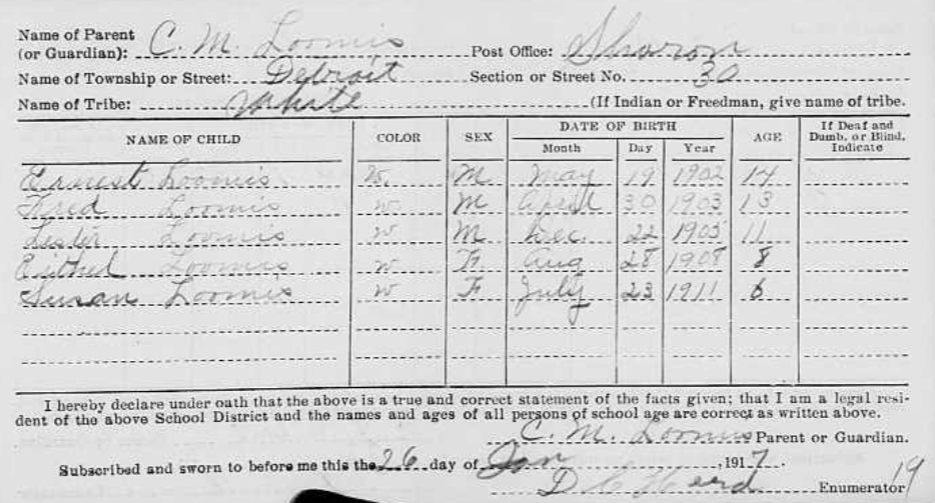
The records helped local governments determine funding needs for individual schools so the information is generally reliable. These records can also provide supporting evidence of parental and familial relationships.
Learn More About School Records for Genealogy
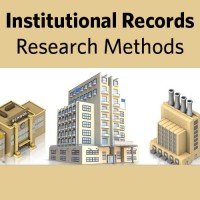 From schools and orphanages to prisons, hospitals, asylums, workhouses, and more, there’s a good chance one or more of your ancestors might be found on record in one of the many types of institutions. In this Premium eLearning video, Institutional Records Research Methods, Lisa Louise Cooke presents methods for finding your ancestors in institutional records, from establishing a workflow and investigating clues found in the census and other records to resources and strategies for digging up the records. This 40-minute video includes a downloadable handout and is available right now to all Premium eLearning members. Click here to sign up!
From schools and orphanages to prisons, hospitals, asylums, workhouses, and more, there’s a good chance one or more of your ancestors might be found on record in one of the many types of institutions. In this Premium eLearning video, Institutional Records Research Methods, Lisa Louise Cooke presents methods for finding your ancestors in institutional records, from establishing a workflow and investigating clues found in the census and other records to resources and strategies for digging up the records. This 40-minute video includes a downloadable handout and is available right now to all Premium eLearning members. Click here to sign up!
Disclosure: This article contains affiliate links and Genealogy Gems will be compensated if you make a purchase after clicking on these links (at no additional cost to you). Thank you for supporting Genealogy Gems!




